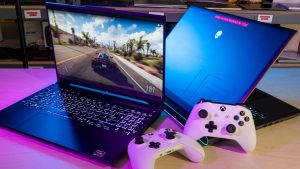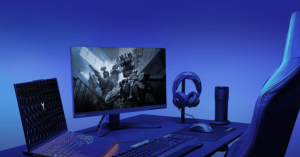When looking to invest in a gaming laptop, here’s the catch: the rising number of designs on the market can make it seem like a nightmare. With the growing demand, such gaming laptops cater to multitudes of gaming audiences, from casual to competitive. Still, many gamers find the task of selecting a single device exhausting considering the specifications and features available in the current devices on the market. But the upside is that, with proper direction, choosing the best gaming laptop is not a hassle. This guide will help you do just that by providing you with the specifics to make sure that your new laptop is capable of delivering the performance that you desire without exceeding your budget.
Recognize The Problem
Before you go and start browsing specs pages and performance figures, it is a good idea to first take a step back and think about your gaming needs in particular. Simple games like “The Sims” or basic indie titles are likely to attract a beginner. Or, someone who engages in a competitive level playing “Call of Duty,” “Cyberpunk 2077,” or “Elden Ring” would fit the latter category. Such games are important as they will outline the sort of hardware you should invest in. For example, a computer gamer will not need high-performance GPUs, whereas someone interested in esports would own a gaming laptop with the highest processors and the fastest refresh rate.
Besides gaming, what other activities do you see your laptop being used for? If you’re a student or a working person who also intends to use the laptop for productivity, then a more balanced configuration that’s good for multitasking can be required as well. Understanding your primary requirements helps to slim down options considerably.
Key Components to Consider
Out of all, what specifications should I look for in a gaming laptop that apply to my favorite games? As a start, let’s spend some time on what most gamers would call the two most important aspects of gaming, which, by the way, are the system’s CPU and GPU. An AMD Ryzen 7 or an Intel Core i7 would be sufficient to handle physics calculations and in-game AI, which will be able to assist most in-game actions as well as general performance. NVIDIA GeForce RTX 3060 or higher will still be needed to run any AAA game smoothly at high resolutions without racing too frequently.
An important factor is the amount of RAM. Fortunately, 16GB of RAM is not too costly in today’s age and is highly recommended for gaming. The use of 8GB of RAM would work in some circumstances for casual gaming; however, making the upgrade to 16GB guarantees a more ‘future-proof’ configuration. Similarly important is the storage; anything below an SSD in current times is a mistake for any gamer due to the HDD’s poor load times. A storage of 512GB SSD is appropriate for high-storage games and applications needed by the current majority of users.
Last but not least is the screen, to which a fair amount of attention also needs to be paid. I recommend using at least a Full HD (1920×1080) resolution and a high refresh rate display for 120Hz and above for faster frame rates in FPS games. 4K laptops are great for heavy specifications but bear in mind that 4K is going to put an additional load on the system during gameplay.
Portability vs. Performance
Adjusting the right degree of definition between portability and performance is a skill. Even though gaming laptops are portable in their natural sense, their mass, size, and form factor may be completely different. Now, for example, should you pick a more portable laptop with a thinner profile and reduced mass if you intend to carry the laptop to work or college? Although warm, lightly built gaming laptops tend to be a little lagging as performance has to be sacrificed due to thermal constraints.
On the flip side of this, if cooling support along with performance is the key that you desire, then thicker laptops with larger display sizes along with superior cooling structures would be best for your utilization. As these machines tend to come with more powerful components, they can maintain higher sustained performance levels for longer periods while gaming, so they would roughly house over a price model. Evaluate your lifestyle as well as the frequency within which you are likely to move around with your laptop in order to be able to determine this degree of balance.
Battery Life Expectations
The battery life on gaming laptops is fairly average since the high-performance components along with the high-resolution display can drain a lot of power. When it comes to high settings, the majority of gaming laptops only have a battery life of around 3-5 hours in terms of intensive gaming. Nonetheless, gaming laptops that incorporate more advanced CPUs and GPUs, such as Intel’s 13th Generation or NVIDIA’s 40 Series, may be able to increase this figure even further.
When not being used for gaming, some models can last up to 8-10 hours on a single charge. If this is important to you, look for laptops that have integrated systems to manage power or battery management systems, and always read reviews to check the real-life battery life.
Connectivity and Expandability
The number and type of game connections found in any given gaming laptop can determine the experience you will get overall. Ensure your laptop comes with ports necessary, such as USB-A, USB-C, HDMI, and Ethernet ports, for a reliable wired internet connection, which is vital for online gaming. If not always needed, Thunderbolt 4 can also serve the purpose of allowing for faster file transfer rates or additional devices like monitors or GPUs.
For wireless connections, laptops supporting Wi-Fi 6 or Wi-Fi 6E options should also be considered since these provide much better and more stable connections than older standards. Any gamers who tend to use external accessories, including gaming mice, keyboards, or headsets, should check the Bluetooth version on the laptop to make sure it is compatible with current devices.
The four key considerations discussed above are expandability as well. Some laptops come with options to upgrade RAM or additional storage slots, which in turn means the life of your device will extend based on increased user needs.
Design and Build Quality
This is because if you often travel with your laptop, you will appreciate how solid a PC it is. If a gaming laptop has strong materials like aluminum or magnesium alloy, it can improve its durability without adding excessive weight. Rubberized grips or matte finishes can also improve the feel of the laptop.
Cooling is another critical part of a gaming laptop’s structure. High-performance components generate a lot of heat, which is bad for performance too. Take a look at the laptops that have several fans, heat pipes, or even vapor chambers for distributing heat effectively. Some manufacturers also provide fans with custom specifications in software in order to choose peak cooling or quietness.
FAQs
1. Can I use, for example, an upgrade kit to improve the performance of my laptop?
Some components, such as RAM and storage, are often possible to upgrade in gaming laptops. However, in most circumstances, CPUs and GPUs are soldered onto the motherboard, which makes upgrading these impossible. Always bear in mind the specifications before making the purchase.
2. Is there an ideal weight that a portable gaming laptop should be?
Portable gaming laptops are usually reasonably lightweight, ranging from 4 to 6 pounds, making them not only performance-oriented but also portable. Such models that weigh less perform in the lower range or have fewer features as a trade-off.
3. To what extent does the display’s refresh rate matter?
While players who experience more in FPS games and fast-paced games benefit from high refresh rates such as 120Hz or 144Hz, casual gamers can rely on displays rated 60Hz.
4. Which is more important for gaming, the GPU or CPU?
The answer is ‘yes’; if the task is specific gaming, then the GPU performs better, but with a single core, a good CPU balance completes better functioning.
5. What ports are helpful on a gaming laptop?
Other ports include USB-C, USB-A, HDMI, and Ethernet. Thunderbolt 4 compatibility is an advantage for external display devices and larger file transfers.
Conclusion
The only way to seamlessly get a perfect gaming laptop is to combine various essential gaming laptop needs. If the requirements are pear, whether one is in search of the best performance for AAA gaming or just a compact gaming laptop for smooth casual gaming sessions in a hurry, always take the hardware readings seriously, including GPUs, CPUs, and displays, and never compromise on portability, battery life, or the budget.
Having considered all these aspects, now you are set to start looking for that ideal gaming laptop that suits you the most. Enjoy the games!



